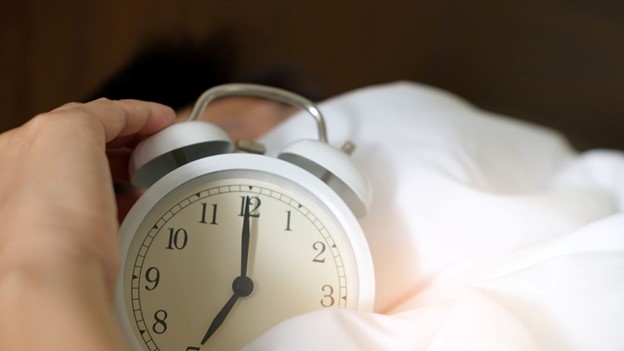Trouble sleeping? Try improving your sleep hygiene

The stresses caused by the prolonged COVID-19 pandemic have left many people battling restless nights and insomnia. The uncertainty and disruption in people’s lives is heightened even more with the Omicron variant’s rapid emergence right before the holidays.
Dr. Neil Levitsky, staff psychiatrist at North York General, recently explored how to look after your sleep and deal with insomnia in his talk at the Healthy Hospitals Working Group Virtual Conference. This collaborative of hospital health care professionals from across Ontario exchanges best practices and innovative ways to nurture the mind, body, and spirit.
The Pulse caught up with Dr. Levitsky—who specializes in cognitive behavioural therapy and other related approaches—to learn about what we can all do to get much needed rest.
Why is sleep important?
Sleep is a very basic need, and we know that lack of adequate sleep contributes to many physical and mental health problems. Probably the three most important areas people need to focus on for optimal physical and mental health are diet, regular exercise, and getting enough sleep.
In your talk you mentioned the importance of sleep hygiene. Can you explain what this is?
Sleep hygiene includes the things we do that promote healthy sleep. An example is maintaining a consistent sleep schedule. I recommend having a set wake time, even on the weekends. Even if you go to bed late, you must maintain set wake time because sleeping in creates a jet lag feeling on Mondays. I also recommend trying to wake up quickly. Try to get out of bed soon after you’re awake, turn on the lights, and get natural light within an hour if possible.
What role does food and exercise play in sleep hygiene?
A lot of people will say, “don’t snack in the evening”, or “don’t eat after dinner.” The main reason for this is because if you eat too heavy late at night, it will obviously be harder to fall asleep. But being hungry may also keep you awake, so I would say try to avoid going to bed super hungry or super full.
Getting regular exercise helps a lot with regular sleep. The thing with exercise though, is that exercising that day doesn’t necessarily mean you’ll get better sleep that night. The effects of exercise on sleep seem to be more cumulative. If you exercise regularly, it starts having a general effect on sleep after some time. You really must stick with it. The general rule is not to exercise too close to when you want to fall asleep, because then you’ll be too stimulated.
Wouldn’t taking a sleeping pill be a lot easier?
While there are a lot of good sleeping medications available, they all have some effects. The perfect sleeping pill that is non-addictive, that you don’t build up a tolerance to, that knocks you out for the whole night with no side effects, does not exist.
Your talk focused on how Cognitive Behavioural Therapy (CBT) can treat insomnia. What is CBT and how can it help people with insomnia sleep better?
Cognitive Behavioural Therapy (CBT) is a very practical, hands-on approach to therapy where people are taught skills to identify and change negative thoughts and problematic assumptions and beliefs, and to also make behavioural changes.
CBT for insomnia has been very well researched, and has been shown to work as well, or even better than sleep medications. When applied to insomnia, it aims to restore the body’s natural ability to sleep. It also addresses the underlying causes of a sleep disorder, which medications can’t do.
What other tips do you have for those who aren’t sleeping well??
Have a wind down routine that is 20 to 60 minutes long. This will allow the brain to gently slow down. Do things that are calming and relaxing. Stretching and reading are both good examples of this.
You can also dim the lights and try to turn off electronic devices an hour before bedtime. The light that enters your eyes from electronic devices supresses melatonin and can be quite stimulating. Does this mean that you can never look at your phone or computer in the evening? No, but maybe try not to use a brightly lit phone in the minutes leading up to when you’re trying to go to bed.
This interview has been edited for length and clarity.
